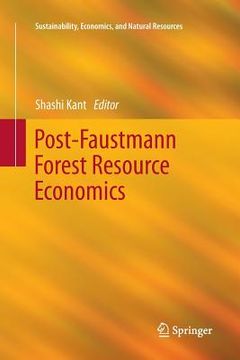Share
Post-Faustmann Forest Resource Economics
Kant, Shashi (Author)
·
Springer
· Paperback
Post-Faustmann Forest Resource Economics - Kant, Shashi
Choose the list to add your product or create one New List
✓ Product added successfully to the Wishlist.
Go to My Wishlists
Origin: U.S.A.
(Import costs included in the price)
It will be shipped from our warehouse between
Wednesday, July 24 and
Wednesday, July 31.
You will receive it anywhere in United Kingdom between 1 and 3 business days after shipment.
Synopsis "Post-Faustmann Forest Resource Economics"
The current paradigm of forest economics is based on Faustmann Formulation (FF) of land expectation value proposed by Martin Faustmann. It was a great achievement by a forester to propose a formulation that captures some fundamental economic features of capital theory which. However, the followers of the FF approach have trapped themselves into the past, and have not shown any indication of economic acumen of the great Faustmann. This has resulted in a common problem in the current paradigm of forest economics, known as Faustmann Forest Resource Economics (FFRE), to prescribe the application of a single (FF) approach to all situations irrespective of the specific features of the situation. The current state of forest economics is similar to that of neoclassical economics, and is full of inefficiencies. In neoclassical economics, inefficiencies are due to its "locked-in" position in rational economic man, while in forest economics inefficiencies are due to its "locked-in" position in the FF. The focus of this volume is on the new paradigm of forest economics termed as Post-Faustmann Forest Resource Economics (PFFRE). The first chapter lays the foundation of the PFFRE, and presents the key distinctions between the FFRE and the PFFRE. The volume includes twelve other chapters that address issues related to forest economics from perspectives different than the FFRE. Chapter 2 to 6 are focused on issues related to human behavior that is different than the rational economic man, Chapter 7 and 8 on public choice theory, Chapter 9 and 10 on systems approaches, and Chapter 11 to 13 on incremental approaches to incorporate new features in the FFRE.
- 0% (0)
- 0% (0)
- 0% (0)
- 0% (0)
- 0% (0)
All books in our catalog are Original.
The book is written in English.
The binding of this edition is Paperback.
✓ Producto agregado correctamente al carro, Ir a Pagar.

